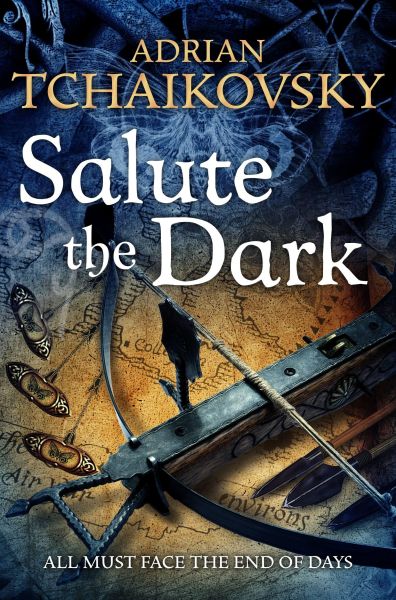The Night Gone Black
Salute the Dark (Shadow of the Apt, volume 4)
By Adrian Tchaikovsky

13 Apr, 2018
0 comments
2010’s Salute the Dark is the fourth book in Adrian Tchaikovsky’s Shadows of the Apt series.
Despite the efforts of Stenwald Maker, niece Cheerwell, ward Tynisa, and the rest of Stenwald’s agents, the war against the Wasp Empire is not going well for the city-state of Collegium and its allies.
Stenwald has a dwindling collection of would-be adventurers to carry out his cunning plans. Some of his friends are badly wounded, some are emotionally traumatized to the brink of madness, one has turned traitor, and many have fallen. Tisamon has vanished on a mad quest to kill the Wasp Emperor single-handed. Oh, and there is a large Wasp army parked outside Collegium’s walls.
With victory over the Lowlands seemingly assured, Wasp Empire functionaries are focusing on how to divide the spoils. High-ranking Wasp officers connive to bring down their rivals and ignore the (to their eyes) disorganized rabble who oppose them.
One Lowlander strategy is to encourage rebellion in recently subjugated cities. Every soldier occupied dealing with uprisings in Solarno, Szar, Myna, and Thark is a soldier who cannot be dispatched to Collegium. The cost for the rebels may be high; one general has weapons of mass destruction he is eager to test.
Worst of all, the Mosquito-kinden sorcerer Uctebri has his hands on the Shadow Box, a magical artifact which, he claims, can make Emperor Alvdan II immortal. The sorcerer has promised more than he can fulfill, so allies himself with the Emperor’s desperate sister Seda. He hopes to salvage something from looming failure.
The emperor does not completely trust Uctebri; he has survived various attempts on his life and throne by being intensely paranoid. That is why Seda is the only remaining member of his family (and she will NOT survive once he is an immortal). Of course, Alvdan’s enemy-detector is not infallible. He has placed his hopes for immortality into the hands of a clearly evil sorcerer. Ah, well. I am sure it will all work out in the end.
~oOo~
In addition to having a weird mix of high and low technology, Tchaikovsky’s world is oddly provincial. Despite its ambitions as a centre of learning, Collegium seems to lack any great curiosity about far off lands; there is no Kin Herodotus. This peculiar ignorance is hard to reconcile with the level of technology we see, although I suppose the tendency of unfamiliar regions to be home to Dark Things That Eat Would-Be Pundits explains some of it.
Characters on both sides display an operatic fondness for doomed and suicidal plans. This makes for a narrative in which the reader cannot begin to guess which of the many characters will survive. Nobody, not even the protagonists, has plot immunity [1].
Although the first half of the book has pacing issues, this is more than remedied in the second book, when all the careful positioning transitions into frantic action and an abrupt decrease in the number of named characters.
Tchaikovsky managed to deliver the first four volumes of his series in just two years. (I think some authors would do well to adopt Tchaikovsky-style work ethics. Just sayin’.) Better yet, these first four volumes can be read as a complete multi-volume story (which makes up for the cliffhanger at the end of Dragonfly Falling). Not that this means that the series is over. This is, after all, book four of ten. One war may be over but before it ended, it changed the world. The next six volumes will explore the implications.
Salute the Dark is available here (Amazon) and here (Chapters-Indigo).
1: With the possible exception of two characters for whom I feel a great distaste. Their (mutual) backstabbing is as much a plot facilitator as is the unthinking honesty of protagonist Jim Holden in the Expanse series. Necessary for plot, but not necessarily endearing.
